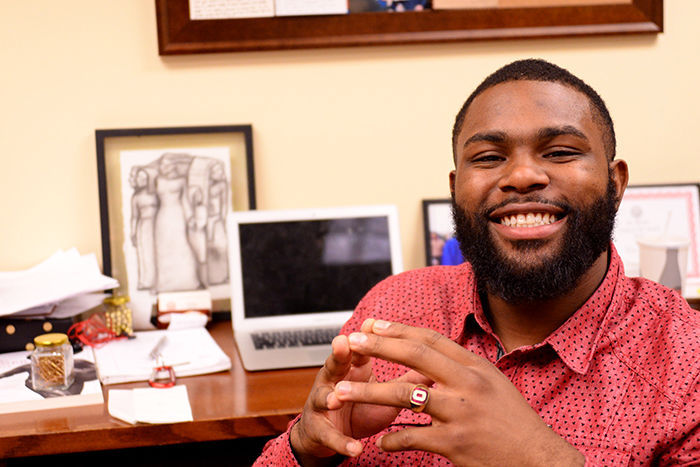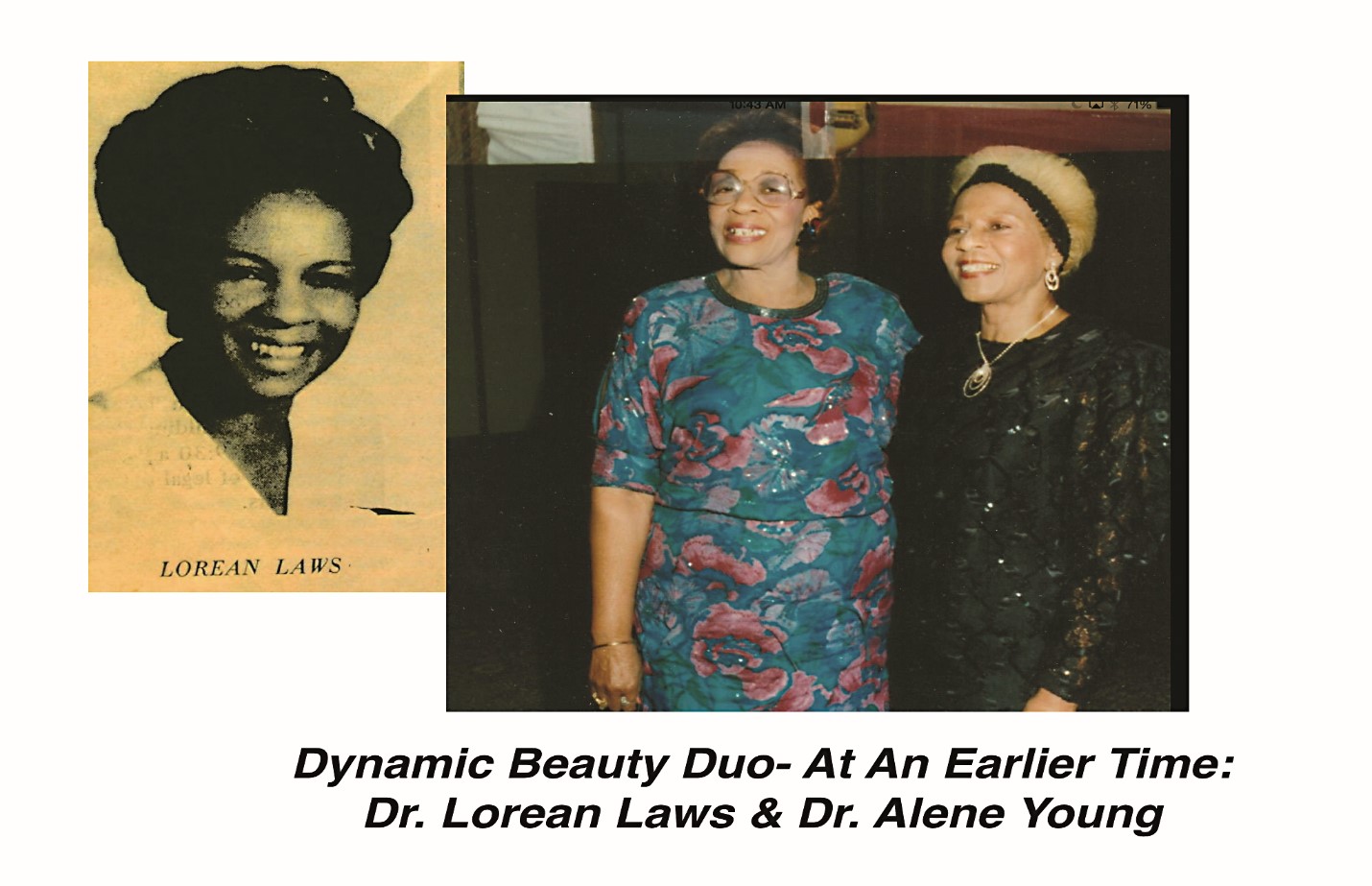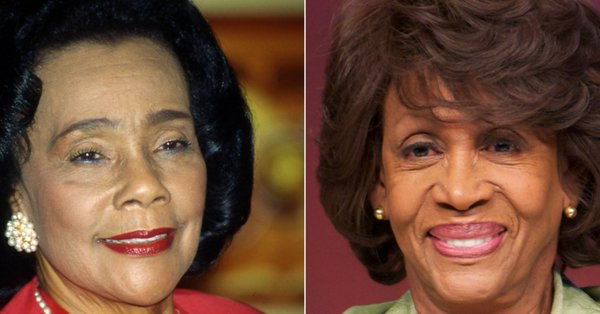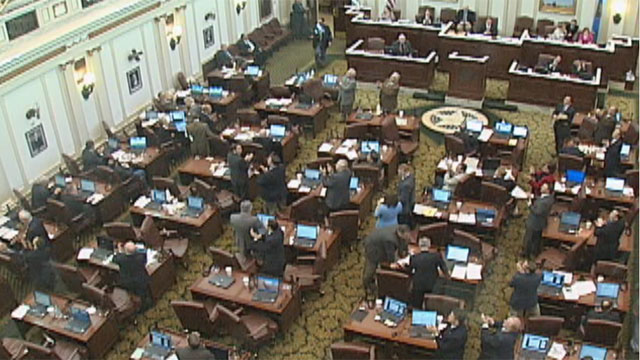
By Spenser Davis, sports editor George Stoia, sports reporter
All Eric Striker has ever wanted to do was make a difference.
A two-year captain at both Armwood High School in Florida and at Oklahoma, Striker was a standout linebacker. He’s best known for leading the Sooners to an upset victory over Alabama in the 2014 Sugar Bowl and powering OU’s defense to a College Football Playoff appearance in 2015.
But, now a year removed from the game, it’s his contributions off the field that continue to live on.
Two years after the Sigma Alpha Epsilon video that rocked OU’s campus and nearly broke the football locker room, Striker sits in an office in the Oklahoma Memorial Union, still looking to make that difference.
That period sparked a passion for activism and social justice issues within Striker.
“I want to leave the world with people knowing that I stood for something,” Striker said. “But I’m hoping that I truly inspire a lot of people, not just my voice but a walking example.”
In January, Striker was hired as a graduate assistant in Student Life at OU and is working on his master’s degree in adult and higher education — something he thinks will open doors for himself down the line. In the meantime, he hopes to foster communication among students on social justice issues.
“Obviously I want to get my master’s, but also while I’m here, I do want to bring the campus together,” Striker said. “Because I do feel we’ve come a way, but I feel like we’ve got some more things to do as far as student life and campus life that can help better the whole environment.”
Shortly after he was hired by Student Life, Professor Emeritus George Henderson — who has spent the last 50 years at OU as a racial pioneer and leader for the black community — spoke to Striker about his opportunity.
“I told him, ‘It’s your turn now,’” said Henderson, who established the Human Relations department at OU and was the first black man to own a home in Norman. “It’s (Striker’s) turn to pick up the gauntlet and move the agenda forward if that’s what (he wants) to do.”
Striker started on this path on March 8, 2015, the evening the SAE video became public. Just before midnight, Striker posted an expletive-laced video — he later apologized for his profanity — on Snapchat expressing his raw emotions, decrying the racial resentment he had felt on campus. Two days later, a more-subdued Striker appeared on CNN, representing all athletes at OU, regardless of sport or race.
His poise caught the eye of his future boss, Quy Nguyen, who heads up Student Life at OU.
“I think it came at a time when he could have remained quiet,” Nguyen said. “And I really appreciate him because he spoke up. He wanted to make himself heard. But then he also included people, it wasn’t just ‘Eric Striker.’ I think what he did so incredibly well was getting the athletic department on board to where they felt unified, no matter what you look like or what you did.”
For Striker, having people focused on his words and actions was nothing new.
“It seems to be throughout my life, whether that was middle school, high school, or even here, for some reason I seem to be the guy that is the one to speak out,” Striker said. “I seem to be that guy that my peers and my classmates see as the guy to rally around and say, ‘Hey you are the voice.’”
Leadership
Nearly a decade ago, inside a Tampa, Florida, middle school, Striker first discovered he had a unique presence — whether he wanted it or not. It was his eighth grade language arts teacher, Ardra Daniels, who broke the news.
“We kept telling him, ‘You can be a leader in so many ways,’” said Daniels, who is in her 15th year of teaching at Progress Village Middle Magnet.
Striker recalled the conversation vividly.
“‘When you come into class, if you’re loud and rowdy and you’re being a goofball, do you notice the whole class is doing that? But when you come in ready to focus, and really want to learn, you see the impact that you have on the class,’” Striker recalled her telling him. “And before that moment, I never knew that.”
“That was the moment where I said, ‘I really am (a leader).’”
Striker utilized that gift to unify student athletes in the days and weeks after SAE. He decided to speak up not only as an athlete but as a human being.
“We’re not going to be what people define us as athletes — play football, do your sport and keep your mouth shut,” Striker said. “That’s kind of asinine to me. We’re human beings too. We have family members. We have people back home, and we deal with these things on a daily basis all the time.”
But even now that his football days are over, his message is still the same.
“At the end of the day, we’re all people and we’ve all got love for each other,” he said. “I wanted to be defined as Eric Striker. I want you to get to know me for who I am. I didn’t want for you to glorify me for the things I did on the field, because there’s numerous guys who can do those great things on the field. But who am I off the field? Am I an A-hole to you? Define me by my character and not by what I do on the field.
“All I’m saying is, I’m just a human being. I’m no better than the next person. But I realize the status that the football players have, this pedestal.”
Striker has already left a lasting influence once before — his photo still has a place on the “Wall of Fame” in the Progress Village Middle Magnet guidance office.
“He’s been one of the great ones to come through,” Daniels said. But that wasn’t her favorite memory of Striker, even if it was the most impactful.
“I think my favorite one was the day that he hugged me and just said, ‘Thank you for believing in me and not giving up on me,’” she recalled. “And that was right before he went to college. … I think that’s why I’m in education. I can see further down the road sometimes, and young people don’t always know.”
“I’m just proud of him.”
Eric Striker talks about his new podcast “Off the Chain” that he co-hosts with former Sooner athletes Ty Darlington and Lauren Chamberlain:
Legacy
It’s unknown where Striker’s journey will head next — whether that’s in Oklahoma or somewhere else — but his vision is clear.
“I want to be in a position to help bring a change in a positive way, help educate kids, try to help give them what they need, the knowledge to have a understanding to be successful, I guess, as a long term goal,” he said.
As Striker steps down from the “pedestal” of being an Oklahoma football player, he’ll get to practice what he preaches.
“Football was great and I love the game, but I’m still a human being,” he said. “I just want people to see me as just like everybody else. Fighting for the same things … I’m not different because I put the Sooners (uniform) on on Saturday and go out there and ball out and I’m on ESPN, so what? That don’t mean nothing. I love the game, I played the game, but that don’t mean that I’m separate.”
Striker is after something much greater than success on the gridiron — he aspires to leave a legacy that will be remembered for generations.
“I would want people to say, ‘He inspired a lot of us, he stood for something.’ Kind of the ways I think about Muhammad Ali, Martin Luther King, all these great, great people that came before us that stood for people,” Striker said. “I’ll be happy that my kids, when they’re coming up, say, ‘Daddy stood for something.’ With these issues going on, what did I do? I’m just somebody who’s trying to help. I want it to be known that I stood for something.”
Andrew Clark contributed to this report.










